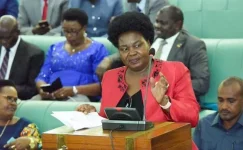Uganda's Parliament voted to let the government borrow $190 million from Stanbic Bank despite warnings from its Committee and Auditor General. They needed money to buy out Umeme, the electricity company whose 20-year contract ends soon. This amount equals about 700 billion Ugandan shillings. The Committee chair, John Ikojo, asked lawmakers to wait until the Auditor General could check how much Uganda really owes Umeme.
Ikojo told Parliament that Umeme has already recovered most of its investment money from Uganda. The actual amount still owed might be just $127.66 million, according to the Electricity Regulatory Authority. This number keeps changing as Umeme makes new investments and collects more money from electricity bills. The total investments by Umeme reached about $746.8 million, but they already collected $625.22 million back.
The loan comes with steep costs for Ugandan taxpayers. After five years, Uganda will pay Stanbic Bank $235.41 million total, meaning interest payments of $40 million or 162 billion shillings. Ikojo explained that this makes the future payment much more expensive than the current amount. He called it a commercial loan since its grant element sits far below what makes a loan considered favorable.
Maracha County MP Denis Oguzu questioned why nobody knows how much money is in the Escrow Account where Umeme deposits rent and other income. He suggested this money could help pay for the buyout. Oguzu also wondered why the government ignored other payment options available in the licensing agreement, including the Liquidity Facility.
Some lawmakers supported the borrowing plan anyway. Bugweri representative Abdu Katuntu blamed incompetent negotiators for creating the original Umeme deal. He pushed to pay off Umeme quickly because waiting beyond March 31, 2025, triggers huge penalty interest. Attorney General Kiryowa Kiwanuka confirmed these penalties start at 10% interest for the first month, then jump to 15% and eventually 20% if payment delays continue past 91 days.
Speaker Anita Among called for a vote after hearing these arguments. The ruling National Resistance Movement party members formed the majority that approved the loan request. They ignored the Committee's recommendation to halt approval until the Auditor General could determine the exact amount owed to Umeme.
Ikojo told Parliament that Umeme has already recovered most of its investment money from Uganda. The actual amount still owed might be just $127.66 million, according to the Electricity Regulatory Authority. This number keeps changing as Umeme makes new investments and collects more money from electricity bills. The total investments by Umeme reached about $746.8 million, but they already collected $625.22 million back.
The loan comes with steep costs for Ugandan taxpayers. After five years, Uganda will pay Stanbic Bank $235.41 million total, meaning interest payments of $40 million or 162 billion shillings. Ikojo explained that this makes the future payment much more expensive than the current amount. He called it a commercial loan since its grant element sits far below what makes a loan considered favorable.
Maracha County MP Denis Oguzu questioned why nobody knows how much money is in the Escrow Account where Umeme deposits rent and other income. He suggested this money could help pay for the buyout. Oguzu also wondered why the government ignored other payment options available in the licensing agreement, including the Liquidity Facility.
Some lawmakers supported the borrowing plan anyway. Bugweri representative Abdu Katuntu blamed incompetent negotiators for creating the original Umeme deal. He pushed to pay off Umeme quickly because waiting beyond March 31, 2025, triggers huge penalty interest. Attorney General Kiryowa Kiwanuka confirmed these penalties start at 10% interest for the first month, then jump to 15% and eventually 20% if payment delays continue past 91 days.
Speaker Anita Among called for a vote after hearing these arguments. The ruling National Resistance Movement party members formed the majority that approved the loan request. They ignored the Committee's recommendation to halt approval until the Auditor General could determine the exact amount owed to Umeme.












